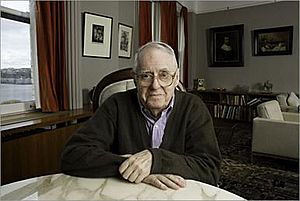Peter Gay facts for kids
Quick facts for kids
Peter Gay
|
|
|---|---|

Gay in 2007
|
|
| Born | Peter Joachim Fröhlich June 20, 1923 Berlin, Germany |
| Died | May 12, 2015 (aged 91) New York, New York, U.S. |
| Nationality | American |
| Alma mater | University of Denver (BA) Columbia University (MA, PhD) |
| Notable awards | Heineken Prizes Award for Scholarly Distinction |
| Spouse |
Ruth Slotkin
(m. 1959; |
Peter Joachim Gay (born Fröhlich; June 20, 1923 – May 12, 2015) was a famous German-American historian, teacher, and author. He was a top professor of history at Yale University. He also directed the Center for Scholars and Writers at the New York Public Library for several years.
Peter Gay wrote more than 25 books. Some of his most well-known works include The Enlightenment: An Interpretation, which won awards, and Weimar Culture: The Outsider as Insider, which was a bestseller. His book Freud: A Life for Our Time was translated into many languages.
Gay was born in Berlin, Germany, in 1923. He moved to the United States in 1941, traveling through Cuba. He taught at Columbia University and later at Yale University. A fellow historian, Sander L. Gilman, called Gay "one of the major American historians of European thought."
Contents
Early Life and Education
Peter Joachim Fröhlich was born into a Jewish family in Berlin. He went to school at Berlin's Goethe-Gymnasium, which is a type of high school in Germany.
When he was 15, his family had to leave Nazi Germany in 1939. They were very lucky because they changed their ship ticket. Their original ship, the MS St. Louis, was turned away and its passengers had to go back to Europe. But Peter's family sailed on the SS Iberia two weeks earlier.
Gay arrived in the United States in 1941. He became an American citizen in 1946. He changed his last name from Fröhlich, which means "happy" in German, to Gay, which means the same in English.
He studied at the University of Denver and then at Columbia University. He earned his Ph.D. in 1951. After finishing his studies, he taught political science and history at Columbia University. Later, he taught at Yale University until he retired in 1993.
Peter Gay's Important Books
Peter Gay was known for his amazing work as a scholar. The New York Times newspaper once called him "the country's most important cultural historian."
Understanding History and Ideas
In 1959, Gay wrote Voltaire's Politics: The Poet as Realist. This book looked at how the famous French writer Voltaire was also a politician. It showed how his political ideas shaped what he wrote.
Gay also wrote a big history of the Enlightenment. This was a time in the 1700s when new ideas about reason, science, and human rights became popular. His book, The Enlightenment: An Interpretation, won a National Book Award in 1967. Many people believe that Gay's book helped show how the Enlightenment brought modern democratic values to the world.
His 1968 book, Weimar Culture, explored the culture of Germany during the Weimar Republic. This was the period in Germany between World War I and the rise of the Nazis.
Psychology and History
Peter Gay was also interested in psychohistory. This is a way of studying history by using ideas from psychology, especially the ideas of Sigmund Freud. Freud was a famous thinker who developed psychoanalysis, a way to understand the human mind.
Starting in 1978, Gay's books began to focus more on psychology. He wrote about how Freud's ideas affected German culture. He also explored how Freud's own life and beliefs, like his atheism, influenced his work. Gay wrote books that used Freud's theories to understand history, such as The Bourgeois Experience: From Victoria to Freud. He also put together a collection of Freud's writings. Gay usually supported Freud's ideas, but he also sometimes offered criticism.
Modern Art and Culture
In 2007, Gay wrote Modernism: The Lure of Heresy. This book explored the modernist movement in art. Modernism was a style that changed how artists created things, from the 1840s to the 1960s. The book showed how this movement started in Paris and spread to other big cities like Berlin and New York. It ended when new art styles like pop art became popular in the 1960s.
Personal Life
Peter Gay married Ruth Slotkin in 1959. She passed away in 2006. He had three stepdaughters.
Death
Peter Gay died at his home in Manhattan, New York, on May 12, 2015. He was 91 years old.
Awards and Recognition
Peter Gay received many awards for his important historical work.
- He won the National Book Award in 1967 for the first part of his book The Enlightenment.
- He received the first Amsterdam Prize for Historical Science in 1990.
- He also won the Gold Medal of the American Academy of Arts and Letters in 1992.
- In 2004, he received the American Historical Association's Award for Scholarly Distinction.
- He was a Guggenheim Fellow twice (1967–68 and 1978–79), which is a special award for scholars.
- The New York Public Library honored him as a "Library Lion" in 1988.
See also
 In Spanish: Peter Gay para niños
In Spanish: Peter Gay para niños
 | Janet Taylor Pickett |
 | Synthia Saint James |
 | Howardena Pindell |
 | Faith Ringgold |

